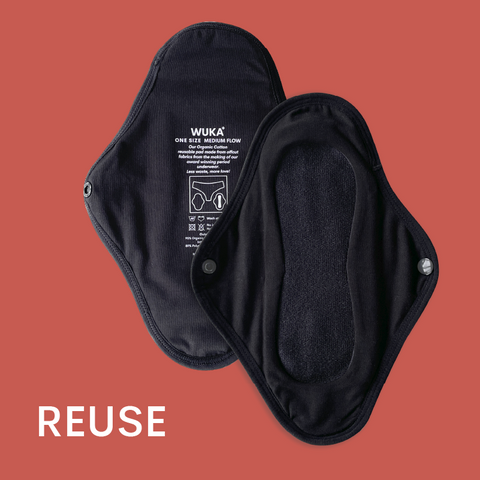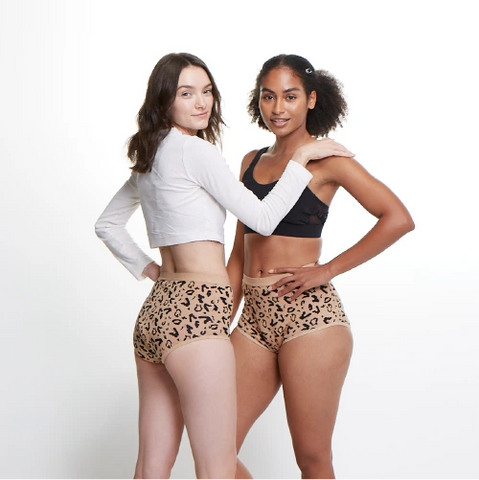How To Have A Sustainable Period

We have choices of sustainable period products and long gone are the days where tampons and pads were the only options. Here's how to have a sustainable period:
The environmental impact of periods
Periods are a natural body function, and it’s currently estimated that in the UK, around 15 million of us are of menstrual age right now (AHPMA). For the average woman, menstruation will last for around 37 years, during which time she will use approximately 11,00 period products as a result. But the products out there to manage our cycles do, unfortunately, have a carbon footprint- and it’s bigger than we thought.
WHY DITCH THE PADS AND TAMPONS?
Single-use pads and tampons are not sustainable, and are costing us - and the planet - dearly. The waste that most tampons and pads create is staggering, with around 200, 000 tonnes of it being produced each year in the UK. In fact, a year’s worth of disposable pads and tampons for one person produces 8.9kg of CO2 emissions! That’s the same as charging a mobile phone more than 1000 times (WUKA Carbon Footprint Report). Sadly, this is just the tip of the iceberg.
Single-use period products are expensive
Did you know that in a life time, one will on average spend £5246 for organic pads and £3500 for non-organic tampons and pads? When we compare this to WUKA period pants, the cost of lifetime use is £2806 PLUS your period is not contributing to waste and plastic use.
Disposable tampons and pads contain plastic
Pads are made from 90% plastic, and one pack of pads is the equivalent of 4 plastic bags! Tampons also contain plastic and so do their applicators. This plastic does not go “away” when we place the items in the bin, but instead ends up filling landfill waste dumps and takes thousands of years to decompose.
Disposable pads and tampons are polluting our waterways
Despite tampons and pads being advised to be thrown into the bin and NOT in the toilet, Plastic Ocean UK report that in the UK 4.6 million single-use plastic period products are flushed down the toilet EVERY DAY – and used tampons and pads are then found in our rivers and seas, polluting our beaches and affecting wildlife.

Plastic waste kills up to 1 million seabirds, 100,000 sea mammals, marine turtles and countless fish each year and remains in our ecosystem for years, harming thousands of sea creatures every day.
What does it mean to have a sustainable period?
Your period doesn’t have to cost the earth. There are ways that we can protect our planet without compromising on comfort, hygiene or health. Having a sustainable period means you’re taking active steps to cut down on plastic pollution and to reduce your period’s carbon footprint. And by reducing the amount of waste that your period produces, you can help to slow climate change.
You can also raise awareness, and educate younger generations on how to have a sustainable period too - with the aim being that all periods will eventually be sustainable. More than a third of British women (36%) are unaware of the impact that single-use period products have on the environment (WUKA Carbon Footprint Report), so sharing this knowledge alone can make a big impact.
Our period pants ensure complete protection against period blood leaks, and at the same time they’re friendly to marine and wildlife too. Their lifetime is about 2 years, which means that on average only 129 pairs of biodegradable pants will go to landfill, compared to 13440 of plastic-based tampons and pads!
How can I have a sustainable period?
Wondering where to start? The choice of reusable period products over disposable is a sustainable one- especially when you consider the fact that from manufacture, shipping and recycling, tampons and pads for one person will produce 8.9kg of CO2 emissions in just one year. Surely the alternative to that is always going to be better?
It only needs to be a simple swap. If you’re open to trying a whole new method of period protection, there are options out there for you- but equally, if you’re not keen on change it up too much, there are still changes you can make to have a greener period.
Reusable period pants
Period pantsare reusable and easy to use! You simply put a pair of pants on, as you would with regular underwear. We advise that the pants are worn for up to 8 hours and after which you can rinse the pants in your bathroom sink or wash with your dark clothes. They are air-dried and can be placed inside out on a radiator and once dry, can be used again and again!
With just one pair of WUKA period pants you can save 200 tampons from going to landfill and each pair of pants can be used for around 2 years! Our period pants contain no plastic and even our packaging is made for compostable materials. The fabrics we use are all sourced sustainably and include compostable Tencel modal which is made from beech trees, as well as GOTs certified organic cotton.
Our period pants ensures complete protection against period blood leaks, and at the same time they’re friendly to marine and wildlife too. Their lifetime is of about 2 years, which means that in a lifetime on average only 129 pairs period pants will be used which can then biodegrade, compared to 13440 of plastic-based tampons and pads going to a landfill!
Reusable pads

Like reusable period pants, our reusable pads are also a sustainable choice for your period. They’re made from offcuts of GOTS organic cotton and also have a lifespan of 2 years. No nasty chemicals near your body, or our oceans- and great for those days where your last pair of period pants just went into the wash, or your menstrual cup needs a back-up.
Ours come with poppers and wings to ensure a comfortable fit and keep them in place for as long as you wear them. Simply wash after use, then store ready for next time.
Menstrual cup
The menstrual cup is exactly what it sounds like - a small cup designed to collect your period blood. It comes in a variety of sizes depending on your flow and is worn internally, much like a tampon. The cup is folded, which might take a few attempts to get right at first, then placed inside the vaginal canal. It then forms a seal between the outside of the cup and the walls of the vagina.
When fitted properly, the cup will collect your period blood without leaking and you shouldn’t be able to feel it there at all. Menstrual cups can be worn for up to 12 hours, and it’s recommended that you empty and wash it first thing in the morning, and just before you go to bed.
Although an eco option, there are still a few drawbacks to using a menstrual cup. Some may find it tricky to insert the cup at first, and changing it while out and about might not always be so easy either. There are also some risks associated with inserting the cup into your vagina; as with tampons, the risk of Toxic Shock Syndrome (TSS) is higher than if using pads or period pants.
Reusable tampon applicators
Reusable tampon applicators are a great option, especially if you use organic tampons. Reusable applicators are designed to be fitted with a tampon of any size for easy insertion, then washed and re-used again and again.
Paired with organic tampons, which are free from pesticides and other nasty chemicals, this is a much better option if you prefer to stick with tampons- although there are still precautions that need to be taken. Never flush your tampon after use - organic tampons are biodegradable, but will still need to be disposed of in a bin. Always check you reusable applicator for signs of wear, and be aware of the signs of TSS.
The Bottom Line on Sustainable Periods
The best option for you, your wallet and the planet is to make the switch to reusable period products. Period pants top our list because they’re a complete replacement for disposable pads and tampons.
They’re easy to use and accessible to all ages. They’re convenient and long lasting. They’re comfortable and leak-proof. In fact, WUKA period pants are also fully biodegradable, so they can be returned to the earth after use - helping to reduce your carbon footprint effectively and efficiently.











